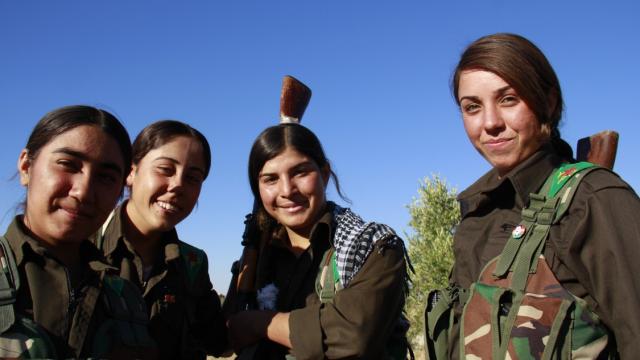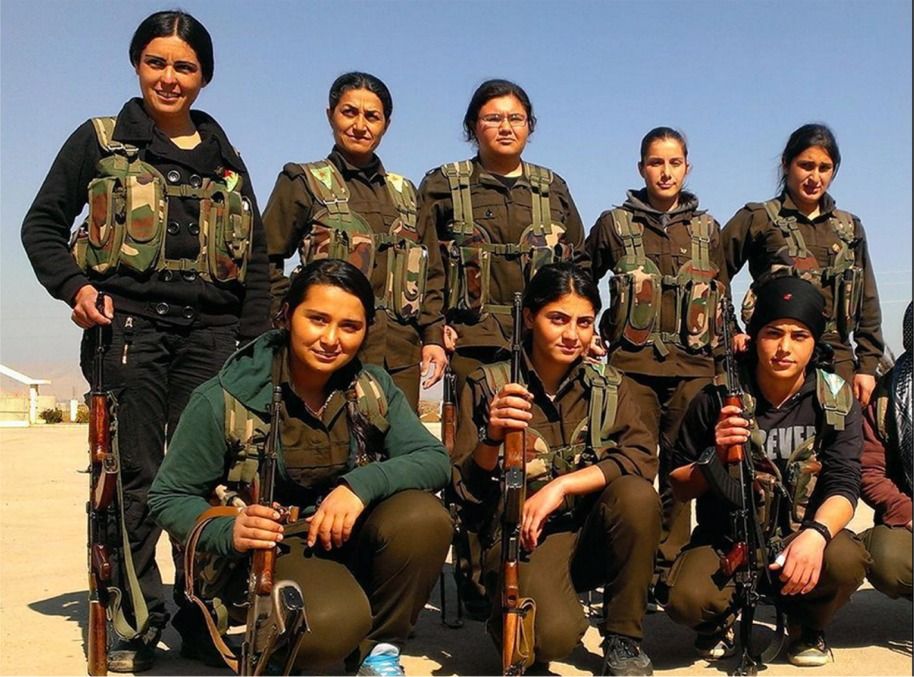
Rojava’s social revolution deserves more global attention and solidarity. The Kurdish autonomous region in Northern Syria is a working experiment creating a society based on direct democracy, with women’s empowerment central in that model. It is being organized beyond and outside a state-centric capitalist system; mutual aid and cooperation are challenging structural exploitation and inequality. Remarkably, all of this emerges out of the Syrian crisis where the predominantly Kurdish Rojava experiment continues despite an existential fight against ISIS, the fascist and genocidal caliphate.
How has all this happened? The book A Small Key Can Open A Large Door: The Rojava Revolution sheds light on the phenomenal story. Edited by a collective known as Strangers In A Tangled Wilderness, the book's introduction gives a sharp, concise and thorough overview of Kurdish history before exploring Rojava through a series of essays, communiques, diary entries and other writings. Authored by those on the ground, including visitors to the region, the book is a fragmented composition whose different powerful voices thread tightly together.
At its core, A Small Key Can Open a Large Door puts in context why people in Rojava have rejected the nation state and Western capitalism after years of oppression from both. The Kurds come from autonomous roots. They lived mainly peacefully and autonomously as tribal clans inside the Ottoman Empire, from the 16th to the early 19th centuries. But from the 1800s onward, they experienced suppression at the hands of imperialist and capitalist forces. After World War I, the Kurdish diaspora spread across Turkey, Syria, Iraq and Iran. The book details how a common story emerges of repression, ethnic cleansing and genocide – often ignored and regularly supported by the Western powers.
“Over and over again, foreign powers intervene for a brief period of time, encouraging Kurdish rebellion just to withdraw support at crucial points and sacrificing the Kurds when they are no longer needed,” state the anonymously authors of the book, who suggest that this history, which repeated itself throughout the 20th century, forced the Kurds to realize they needed to fight for their own freedom.
To understand Rojava today, one must return to the founding of the Kurdish Workers Party, or PKK, in Turkey in 1978 as a seminal moment in that story. The party began as a militant Marxist organization fighting against the Turkish state, replete with bombing campaigns and armed insurgency. From 1984 to 2013, the PKK fought a never-ending guerrilla war.
However, the PKK found itself in crisis in 1999, which became another turning point for the movement. Its leader, Abdullah Ocalan, was captured by the Turkish military, and its tactics of suicide bombings and other attacks were no longer succeeding. People in the West were also confusing them with emerging Jihadist groups.
From prison, Ocalan led the PKK through a transformation, adopting the ideas of the Zapatistas in Chiapas and the work of Murray Bookchin, the anarchist thinker who advocates democratic confederalism; that is, a democratic system without a state. To commemorate Bookchin’s death, in 2006 the PKK council announced its aim to realize those ideas in practice.
In Syria's ongoing civil war since 2011, President Bashar al-Assad’s forces steadily withdrew from controlling the north of the country. This gave the people of Rojava, who inhabit three geographically disconnected areas, a chance to reimagine their society. Inspired by the PKK's shift to democratic confederalism, Rojava has turned what seemed to many to be political science fiction into reality.
A Small Key Can Open A Large Door explains the process by which Rojava created direct democracy governance without a state, built on local assemblies. Unlike other political systems, the popular base retains its power. People send representatives, who change on a revolving basis, to larger councils. But crucially, all decisions return back to the smaller councils for endorsement.
Also, instead of police, the Kurdish non-state keeps the peace with Asayish (security in Turkish). Both these forces and the militias fighting against ISIS are answerable to the local assemblies. In one fascinating segment, the book describes how the Kurdish region has used power-to-the-people principles to reimagine an economic system beyond capitalism. It also emphasizes that Rojava isn't only a Kurdish non-state solution – that direct democracy is open to all religions and races, and the Rojava regions are showing this through their embrace of thousands of refugees displaced from Syria.
Feminism, too, is central within the Rojava revolution. All administrative duties are co-chaired by men and women; all councils must have over 40% of each sex represented. There are female-only Asayish-J, (non-statist police) to deal with crimes against females and children as well as hate crimes. There are also all-female safe houses in each town.
On the battlefield, women-only and co-ed fighting units are another feature of life in Rojava. As the book explains, the Kurdish women are fighting the embodiment of women’s oppression in the form of ISIS: a group that uses rape and sells women into sex slavery. But women in Rojava aren't only assuming political, policing and military responsibilities; they're also challenging sexism, fighting against forced marriage, domestic abuse and the oppression of women across all aspects of Rojava society. The Rojava Revolution is first and foremost a revolution for women by women.
The book offers a bridge for people in the West to understand and appreciate what democratic revolution actually means in the 21st century. Western media have been criticized for ignoring on the whole the social revolution that is sweeping Rojava, and instead focused on the glamour of the region's fighting women. A Small Key Can Open A Large Door breaks down barriers and dispels myths as it paints an accurate, stirring portrait of the life Rojava's people are actively imagining and creating. For anyone who wonders whether another world is possible, this book is essential reading.
3 WAYS TO SHOW YOUR SUPPORT
- Log in to post comments
















